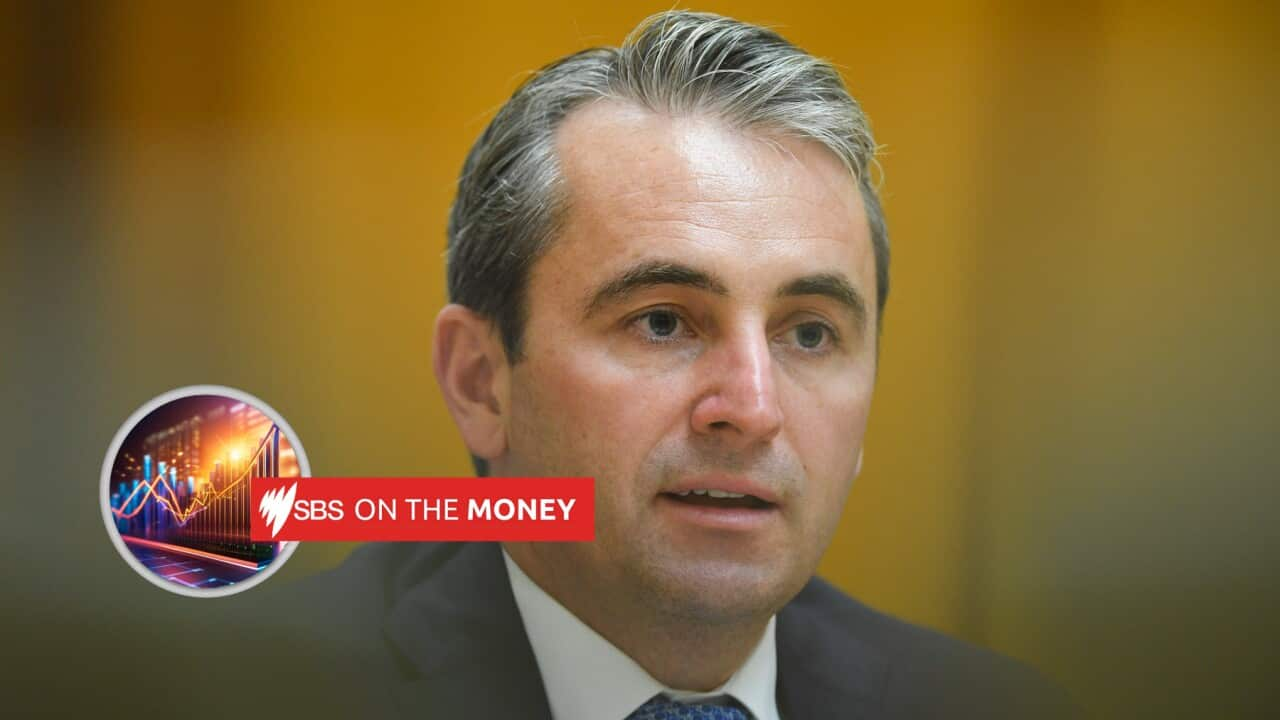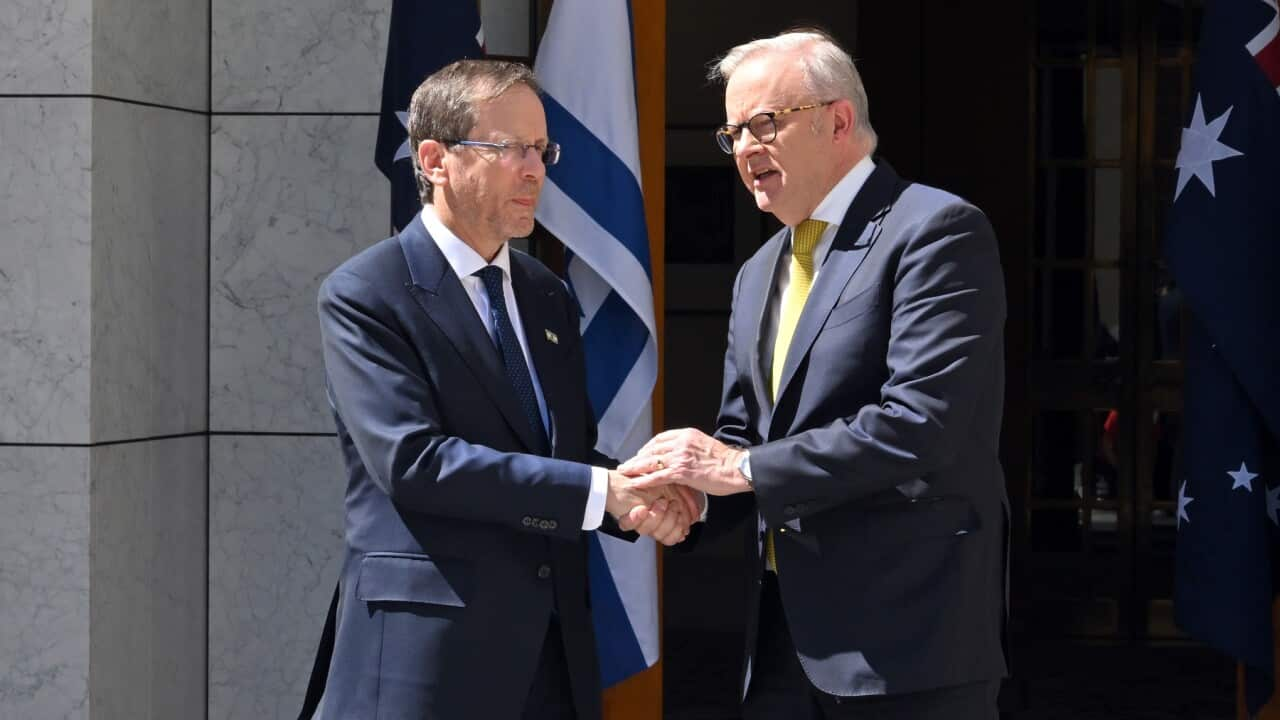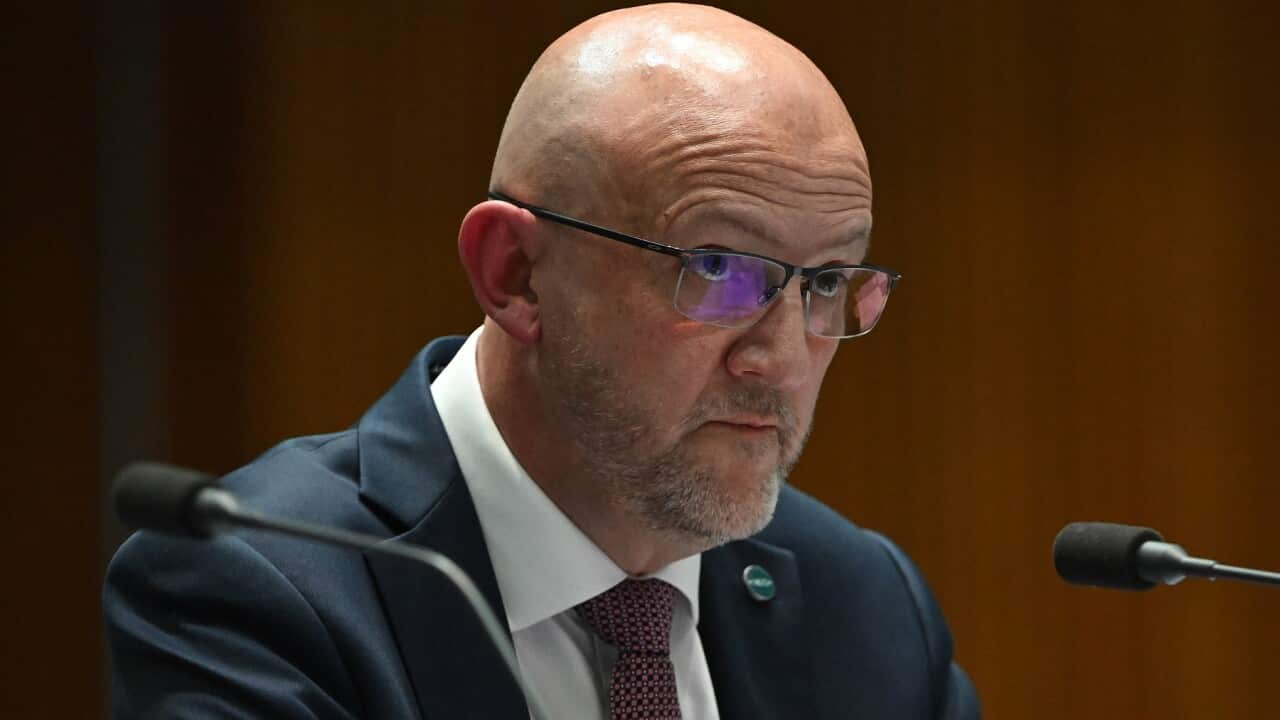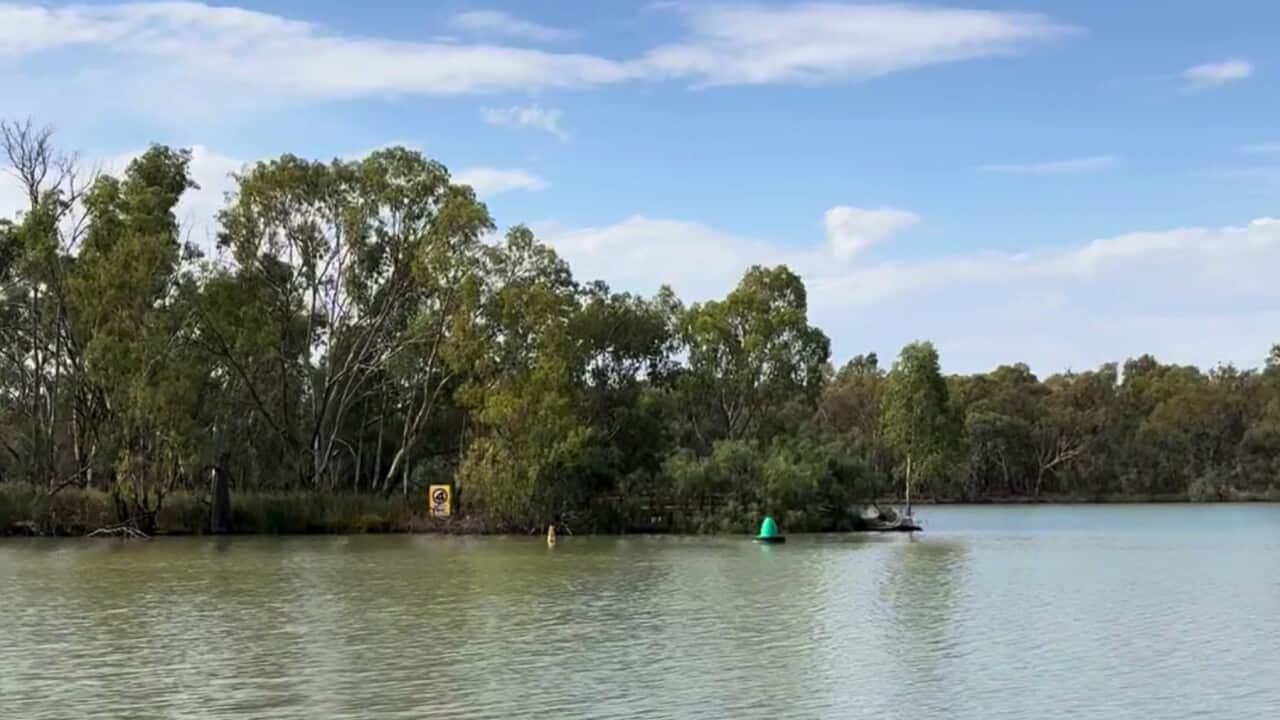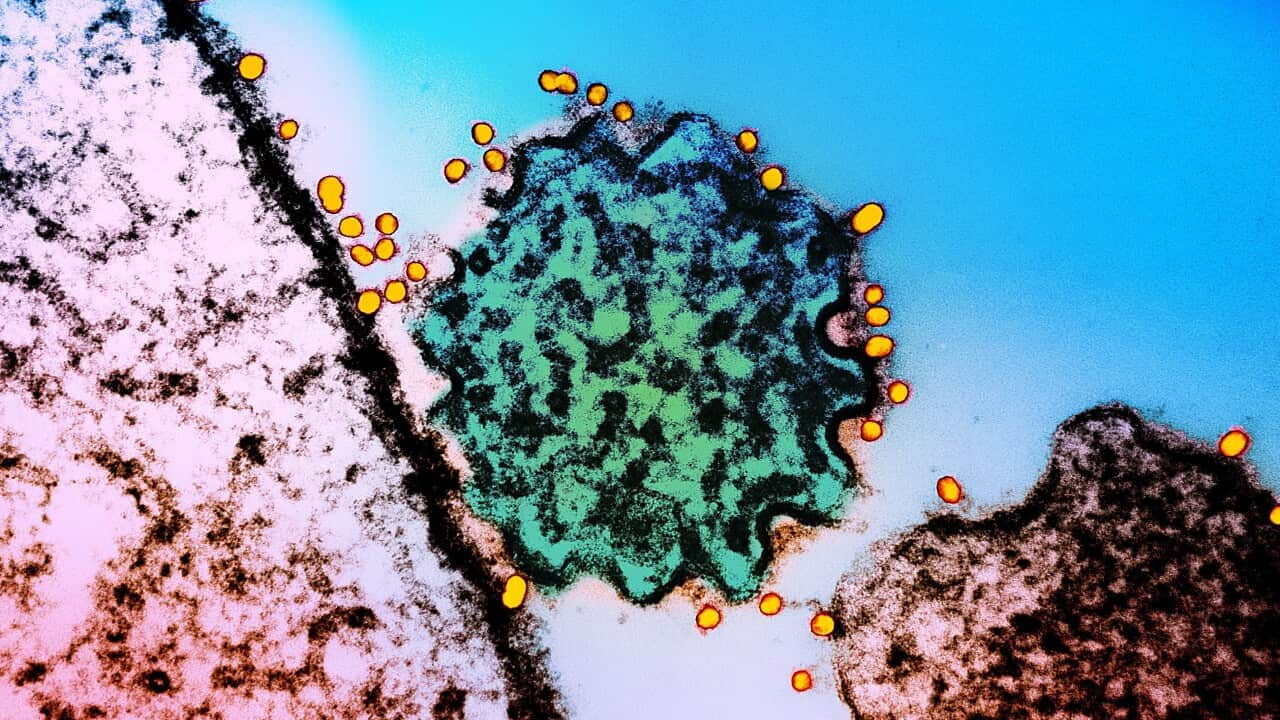Listen to Australian and world news, and follow trending topics with SBS News Podcasts.
TRANSCRIPT
Israeli Prime Minister Benjamin Netanyahu is reportedly backing a plan by defence minister Israel Katz to displace Palestinians in Gaza into large-scale camps.
The proposal, laid out to local reporters by Mr Katz, describes plans to build a large-scale camp in Rafah to hold Gaza's entire population.
Israel is calling the plan 'voluntary migration' into a 'humanitarian city', but some legal experts say it lays out a clear plan for crimes against humanity.
UNRWA Director of External Relations and Communications Tamara Alrifai told Al Jazeera that calling the plan 'humanitarian' is insulting.
"There is nothing humanitarian or humane about seeking to confine the first 600,000 but then the entirety of the population in Gaza into a space that is highly vetted by the Israeli forces that essentially moves Gaza, previously known as the largest open air prison in the world, to the most confined, the most overpopulated open air prison in the world, where the freedom of movement and the access of Gazans in and out of that place is highly, completely regulated by the Government of Israel. Nothing humanitarian or humane about it."
According to Israeli media, the plan describes the camps as a place where Palestinians can de-radicalise, re-integrate, and prepare to relocate, if they wish to do so.
Mr Katz told reporters the camps will initially hold 600,000 people, then the entire population of Gaza, which is more than 2 million people.
Palestinians will have to pass security screenings to enter and, according to Mr Katz, will not be allowed to leave once they have entered.
Mr Katz reportedly told Israeli media that construction of the city may occur during an upcoming ceasefire, which is being discussed in Washington this week.
After a meeting with US President Donald Trump, Mr Netanyahu says the pair are working to find countries that will take in Palestinians.
"We're working with the United States very closely about finding countries that will seek to realise what they always say, that they want to give the Palestinians a better future. And those who, and I think we're getting close to finding several countries. And I think this will give, again, the freedom to choose. Palestinians should have it. And, I hope that we can secure it close by."
Delegations from Israel and Hamas have been in Qatar since Sunday in a renewed push for an agreement, after Mr Trump said last week he had hope a new proposal could lead to a deal.
Donald Trump and Benjamin Netanyahu have met twice for talks in Washington this week.
During their meeting on Monday, the Israeli Prime Minister presented the US President with a letter of nomination for the Nobel Peace Prize.
Speaking after the first meeting, Donald Trump told reporters that Mr Netanyahu has been unfairly treated.
"He's been very unfairly treated. I think what they've done to him in Israel is very unfair having to do with this trial. He's a wartime prime minister had an unbelievable outcome and I think he's been treated very unfairly but he's coming over later we're gonna be talking about I would say almost exclusively Gaza. We've got to get that solved. Gaza is a tragic it's a tragedy it's a tragedy."
Mr Trump's envoy Steve Witkoff, who played a major role in crafting the latest ceasefire proposal, will travel to Doha this week to join discussions there.
The proposal envisages a phased release of hostages, Israeli troop withdrawals from parts of Gaza and discussions on ending the Israeli war on Gaza entirely.
Hamas says it is willing to free all the hostages in exchange for an end to the war and a full Israeli withdrawal from Gaza, but Mr Netanyahu says the offensive will only end once Hamas surrenders, disarms and goes into exile.
Mr Netanyahu says Israel plans to, in his words, finish the job in Gaza.
"We have still to finish the job in Gaza, release all our hostages, eliminate and destroy Hamas’ military and governance capabilities because Gaza must have a different future, for our sake, for everyone’s sake. And no country will settle for less. We certainly will not.”
Israeli minister Zeev Elkin, who sits in Mr Netanyahu's security cabinet, says that there was "a substantial chance" a ceasefire would be agreed.
However, a Qatari spokesperson, Majed Al Ansari, says Qatari and Egyptian mediators were not yet discussing a final ceasefire deal, but still seeking agreement on a framework that would lead to more detailed talks.
“Too early to give any impressions over the talks and how they are going right now between both sides, the only thing that we can say is that there is engagement on both sides, we are talking to both as we're going along. Obviously, what we are trying to do is bridge the gap in the positions on both sides over the sensitive issues. I can't share with you a lot of these issues, but what I can tell you is that there is a positive engagement right now. Both the mediation teams, the Qataris and the Egyptians, are working around the clock to make sure that there is some consensus built on the framework towards the talks.”
As talks of a possible ceasefire in Gaza continue, Israel is once again intensifying attacks on the region.
Health officials in Gaza say Israeli attacks killed at least 60 people, on Tuesday, including three children and a paramedic.
In Gaza, Rasha Wishah is sheltering at a school-turned-shelter.
"I hope the US puts pressure on Israel. The least thing (we hope for) is a ceasefire because we want to rest. We can't. Two years is too much. No country could bear two full years - a country - not a point. Gaza is a point, not a country, a strip as they call it. No country has endured these two years, nor has any country endured the amount of missiles and things that fell upon it, the destruction, martyrs, loss, hunger, and devastation. Even if you are injured and go to the hospital, there is no way to treat you."
Health officials in Lebanon say three people were killed and 13 wounded in an Israeli strike near a Palestinian refugee camp in Tripoli.
Despite a ceasefire agreement with Hezbollah last November Israel has continued attacks on Lebanon, but this marks their first strike on northern Lebanon since the deal.
Israel says it was targeting Hamas in northern Lebanon.
In Israel, a funeral was held to mourn five IDF soldiers killed in Gaza.
Gilad Samuels attended the funeral; he says his support for Israel's actions in Gaza is waning.
"I'm very much disappointed. We're all very much hoping for the end of the war and the return of the hostages. It feels like this meeting was just a PR publicity event for Trump to get a Nobel Peace Prize. The war has been going on for almost two years, and for the most of the war, I was supportive, and I felt we were achieving achievements, but over the past few months, it feels like it's just new dead soldiers every week, and we're not really getting anywhere. Obviously, the news this morning of five dead soldiers is terrible. It feels like it's a weakly event these days, and we're really hoping for an announcement that this will end."
Hospitals across Gaza are currently facing a surge in meningitis cases, which the World Health Organisation says can spread easily in overcrowded tents without proper sanitation.
Ahmad al-Farra is the head of paediatrics and maternity at Nasser Hospital.
He says the hospital has seen almost 40 new cases this week.
"Closing the borders is one of the main causes. Why? Because there is no food, no protein, no fresh vegetables, no fresh fruits, no vitamins, no medical supplies, so the immunity in the population of Gaza (is) at the lower limit, lower border. This has increased the spreading of meningitis nowadays."
The United Nations says 85 per cent of Gaza is currently under Israeli military occupation.
It says nearly 2 million people have been forced into just 54 square kilometres of land, largely covered in rubble.
That's about 15 times smaller than the city of Canberra, which has a population of under 500,000 people.
UN spokesman Stephan Dujarric says the issuance of displacement orders does not relieve any party from the obligation to spare civilians.
"Today, the Israeli authorities issued yet another displacement order for parts of Khan Younis — specifically ordering the displacement of those staying in tents. An initial review of a map published with the order suggests it also includes areas that have not been subjected to displacement orders since before the last ceasefire, which, as you will recall, ended in March. Even the smaller areas where people are being forced to concentrate, now down to about 15 per cent of the Strip and shrinking, are fragmented. They lack even the most basic infrastructure and services, and remain extremely unsafe. We cannot forget that between our daily reports to you, families are trying to survive this nightmare, they are trying to protect their children to the extent possible, and search for whatever minimal food exists."

